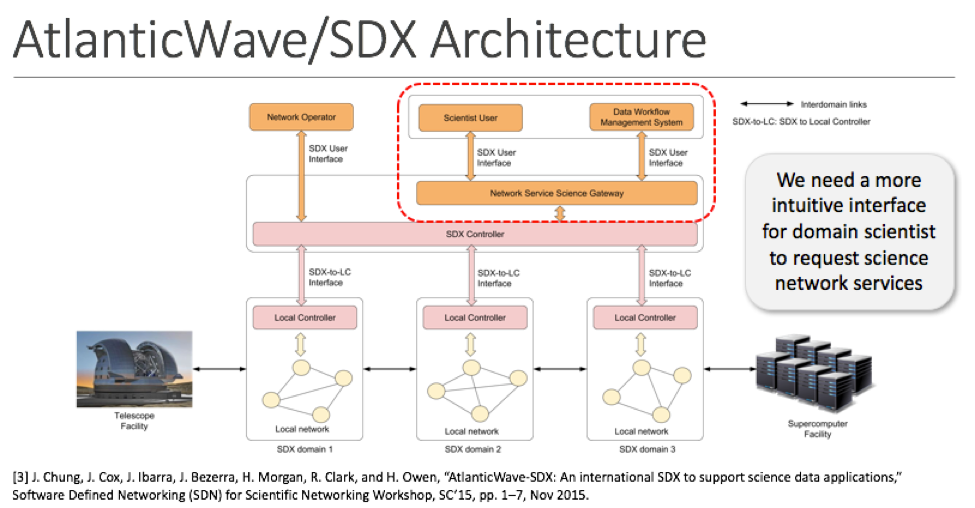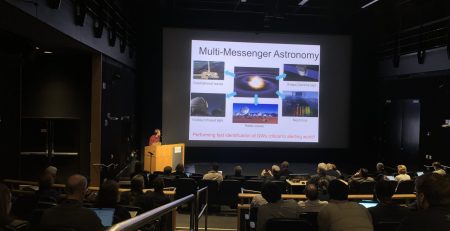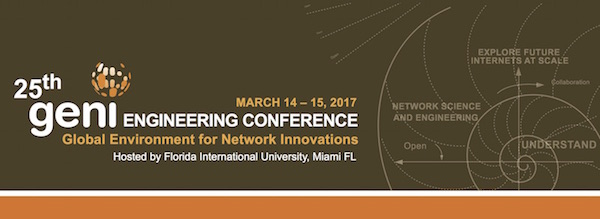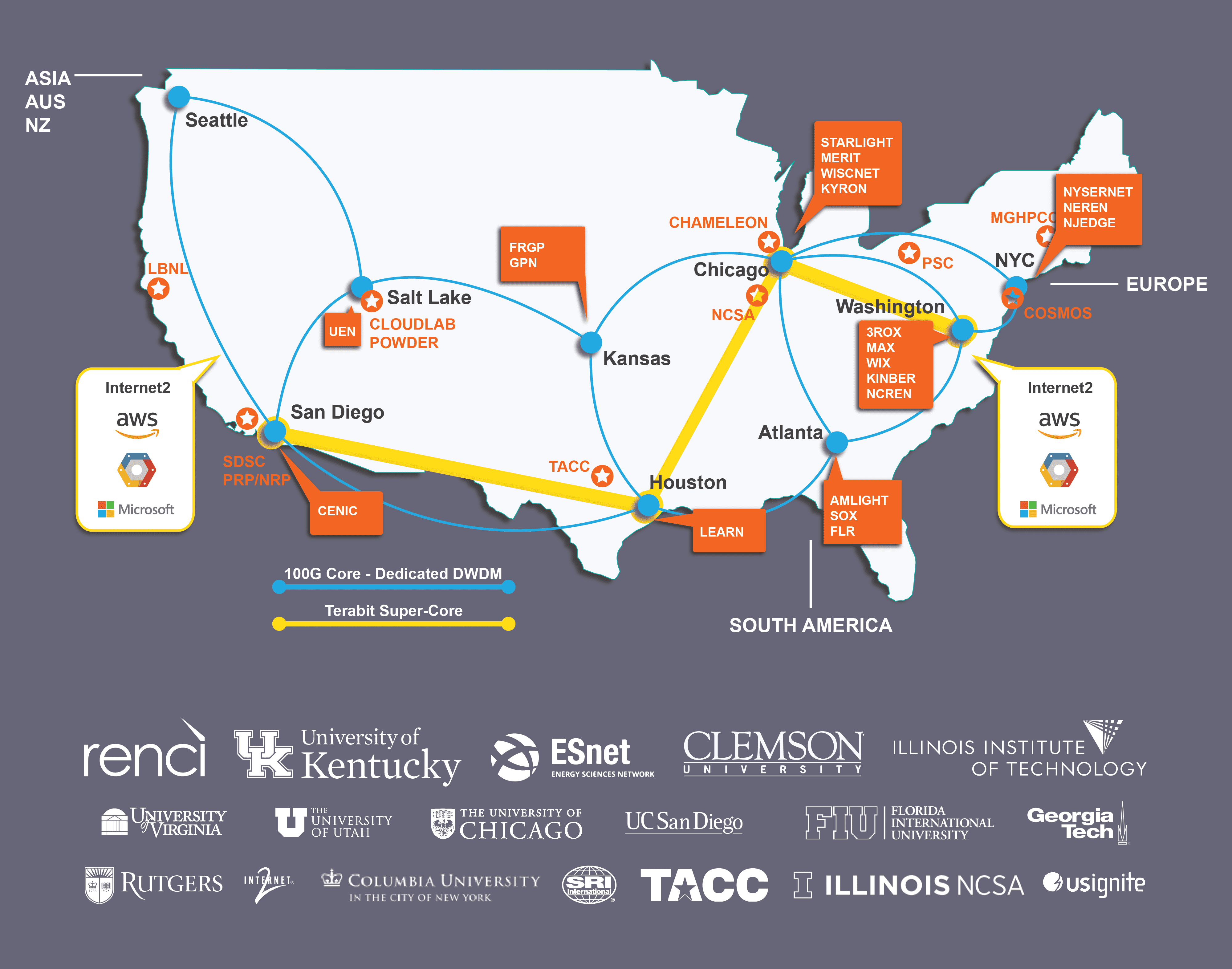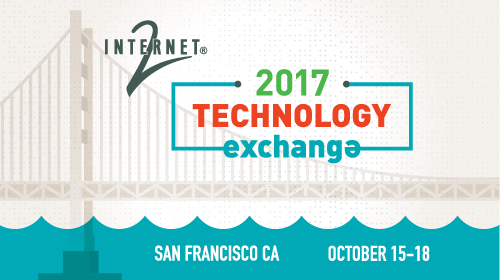AtlanticWave-SDX demo at Supercomputing 2016
AtlanticWave-SDX Team participated in collaborative demonstration “AtlanticWave/SDX Controller for Scientific Data Flows” at the Supercomputing Conference 2016 (SC16) in Salt Lake City, UT, on Tuesday, November 15, 2016. “AtlanticWave-Software Defined Exchange: A Distributed Intercontinental Experimental Software Defined Exchange (AtlanticWave-SDX)” is a collaborative project between Florida International University (FIU) and the Georgia Institute of Technology (GT), funded by National Science Foundation (NSF Award ACI#1451024).
 The first version of the SDX distributed network controller was demonstrated during the Global Lambda Integrated Facility (GLIF16) meeting, co-located with the Internet2 Technology Exchange, in Miami in October 2016. At SC16, Sean Donovan, Lead Software Developer from GT, demonstrated an updated version that will support research, experimental deployments, prototyping and interoperability testing, on national and international scales.
The first version of the SDX distributed network controller was demonstrated during the Global Lambda Integrated Facility (GLIF16) meeting, co-located with the Internet2 Technology Exchange, in Miami in October 2016. At SC16, Sean Donovan, Lead Software Developer from GT, demonstrated an updated version that will support research, experimental deployments, prototyping and interoperability testing, on national and international scales.
A Software-Defined Internet Exchange Point (SDX) is a new technology that has many, often conflicting definitions. The AtlanticWave-SDX Team hope to cement the definition to refer to two specific aspects: first, a SDN-based data plane that connects various networks together, and second, participant networks are able to define forwarding policy within the exchange point by way of a configuration API. Participants can make forwarding decisions based not only on BGP, but based on other considerations.
The AtlanticWave-SDX controller is still under development, but a prototype version will be release by the end of 2016.
AtlanticWave-SDX Team demonstration at SC16:
Title: “AtlanticWave/SDX Controller for Scientific Data Flows”
Download pdf presentation
Date: Nov 15th, 2016
Presenters: Sean Donovan
Booth: 2501 (NCSA), 2437 / 2537 (Caltech)
About AtlanticWave-SDX: Florida International University (FIU) and the Georgia Institute of Technology (GT), funded by the National Science Foundation (NSF award ACI#1451024), implemented AtlanticWave-SDX: a distributed experimental Software-Defined Exchange (SDX), to supporting research, experimental deployments, prototyping and interoperability testing, on national and international scales. AtlanticWave-SDX is comprised of two components: (1) a network infrastructure development component to bridge 100G of network capacity between Research and Education (R&E) backbone networks in the U.S. and South America; and (2) an innovation component to build a distributed intercontinental experimental Software-Defined Internet Exchange Point (SDX) between the U.S. and South America, by leveraging open exchange point resources at SoX (Atlanta), AMPATH (Miami), and Southern Light (São Paulo, Brazil) (www.atlanticwave-sdx.net).
About Caltech: The mission of the California Institute of Technology (Caltech) is to expand human knowledge and benefit society through research integrated with education. We investigate the most challenging, fundamental problems in science and technology in a singularly collegial, interdisciplinary atmosphere, while educating outstanding students to become creative members of society. The contributions of Caltech’s faculty and alumni have earned national and international recognition, including 35 Nobel Prizes (www.caltech.edu).
About CIARA: Florida International University’s Center for Internet Augmented Research and Assessment (CIARA), in the Division of IT, has developed an international, high-performance research connection point in Miami, Florida, called AMPATH (AMericasPATH; www.ampath.net). AMPATH extends participation to underrepresented groups in Latin America and the Caribbean, in science and engineering research and education through the use of high-performance network connections. AMPATH is home to the Americas Lightpaths (AmLight) high-performance network links connecting Latin America to the U.S., funded by the National Science Foundation (NSF), award #ACI-0963053 and the Academic Network of São Paulo (award #2003/13708-0) (http://ciara.fiu.edu/)
About Georgia Institute of Technology: Georgia Institute of Technology, also known as Georgia Tech, is one of the nation’s leading research universities, providing a focused, technologically based education to more than 21,500 undergraduate and graduate students. Georgia Tech has many nationally recognized programs, all top-ranked by peers and publications alike, and is ranked in the nation’s top 10 public universities by U.S. News and World Report (www.gatech.edu).
About SC16: Each year the SCinet’s Network Research Exhibition (NRE) showcases and number of interesting network-based experiments during SC. The goal of the NRE is to showcase technologies that will impact HPC in general and SCinet in particular. Topics for SC16’s Network Research Exhibition demos and experiments range from software-defined networking (SDN) to security/encryption and resilience (www.sc16.supercomputing.org).


